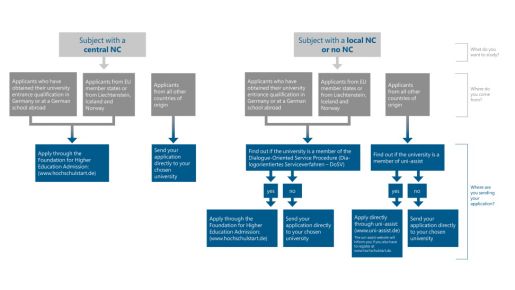

If you want to apply for a place at a German higher education institution, there are some rules you will have to observe. How and where to apply depends on the subject you want to study. You should bear the following checklist in mind when applying for a degree programme in Germany:
Even if you meet the general requirements and have chosen your desired subject, you will frequently not be able to enrol directly. For many degree programmes in Germany there are more prospective students than study places, so applicants first have to take part in an admission procedure . There are two types of admission restrictions: those determined locally, which means they only apply at certain higher education institutions, and those that apply throughout Germany. If your intended degree programme has no admission restrictions, you can usually enrol directly.
Germany-wide admission restrictions: Degree programmes such as medicine, pharmacy, veterinary medicine and dentistry are so popular that admission restrictions apply at all German higher education institutions. They have what is known as a numerus clausus (NC) . Study places are awarded by the Stiftung für Hochschulzulassung ( Foundation for University Admissions ) for applicants from Germany and other EU member states as well as applicants from Liechtenstein, Iceland and Norway (available only in German).
Local admission restrictions: Some degree programmes only have admission restrictions at particular higher education institutions. These are frequently described as NC degree programmes. In addition to an overall average grade, higher education institutions can specify further criteria they will consider when selecting applicants, such as a letter of motivation, tests or selection interviews. These criteria differ between higher education institutions and between study programmes.
TIP: Contact the International Office of your higher education institution directly for information before applying. You can find the academic counselling offices on the Higher Education Compass website.
Foreign students have to apply to the Stiftung für Hochschulzulassung, directly to the higher education institution, or to the University Application Service for International Students (uni-assist) – this depends on which country they come from, what higher education entrance qualification they hold, and what subject they want to study. The following diagram shows how you should proceed in the various cases:

The International Offices of the higher education institutions can help answer this question. They will tell you about the application process and which documents have to be submitted. The application form is available from your chosen higher education institution, from uni-assist or from the Stiftung für Hochschulzulassung (only in German).
As a general rule, you will need the following documents:
Please note: Only officially certified copies and translations are accepted for the application process. Official certifications can be issued for example by the German embassy in your home country. Some higher education institutions also accept documents in English and French.
There is a fee for getting a document certified. Additionally, there is often a fee for the application itself. The processing fee depends on where you apply. If you apply via uni-assist, an assessment of your certificates and preliminary review of your documents costs 75 EUR for your first choice of study and 30 EUR for each application to further courses of study in the same semester.
The process by which the application form for a higher education institution (for example, the institution that appears in the chart) is submitted can take place in various ways, for example, with a form that can be filled out on the Internet and then printed out, or with an online form. Please enquire directly at the international office of the higher education institution to which you are applying.
At most higher education institutions, the application phase for the winter semester starting in September/October begins in early May and ends on 15 July. For the summer semester starting in March/April the application period runs from early December to 15 January. Letters of acceptance are sent out in August/September and in February/March. Rejections are often sent a little later. Private universities may have other deadlines.
Write multiple applications: Submitting more applications to different higher education institutions increases your chances of success.
Choose less popular locations: Most students want to study in major cities or traditional university towns. We recommend applying to higher education institutions at less popular locations.
Gain additional points: The grades on your higher education entrance qualification are not always the only criterion for awarding a study place. Sometimes certain grades are weighted more heavily or there are aptitude tests.
Try your luck: Higher education institutions award some study places by lottery because the originally selected applicants turn down their offered place. It is important to know the dates and conditions of this lottery.
Start in the summer semester: Around one quarter of all Bachelor's programmes can also be started in the summer semester.